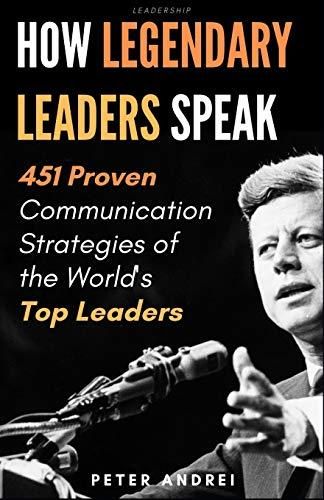Peter Andrei, a communications expert and prolific author on public speaking, relates examples of inspiring orators across history and tells how you can learn to inspire your listeners to action.

Inspire Your Audience
Communications expert Peter Andrei writes that great leaders possess a superpower: the ability to capture their audiences’ attention, hearts and minds, and to encourage them to act. Andrei cites Franklin D. Roosevelt during the Great Depression, Winston Churchill during the Blitz and John F. Kennedy during the Cold War as inspiring orators. The author illuminates how the right words spoken in the right moment can effect change. Andrei’s analysis includes a host of useful tips for today’s would-be inspiring speakers.
Direct Attention
According to Andrei, captivating speakers direct their audiences’ hearts, minds and souls toward a desired goal by not only what they say but how they say it. Legendary leaders throughout history used effective communication – “the most powerful force known to man” – to control attention and connect with their followers.
The speeches of effective communicators reveal patterns and techniques through which speakers channeled audience focus toward support of policies, products and cultural movements. Andrei describes five effective speaking strategies that effective leaders layer to engage and motivate audiences: controlling attention, directing that attention to a purpose, supporting the purpose with intentional action, backing the action with correct thinking, and integrating these strategies by providing a powerful motive.
Controlling Attention
Speakers must capture their audience’s attention. The legendary leaders Andrei cites employed tools and techniques to claim listener focus.
All groups face problems and look to leaders to help them reconnect to the most powerful force known to man to solve those problems.Peter Andrei
Legendary leaders tap into several communication strategies. Bill Clinton, for example, used empathy when addressing how the economy affects the average American. Clinton showed that he cared about voters and felt their pain. President Barack Obama captured attention at the 2004 Democratic National Convention when he told of his upbringing. Stories that touch audiences on a personal level boost a leader’s credibility. Winston Churchill’s “Be Ye Men of Valour” speech during the Blitz, for example, stressed Britons’ dauntless spirit and expressed confidence they would prevail.
Directing Attention Toward a Purpose
After earning your audience’s attention, follow through by directing that attention toward a specific, worthwhile goal. According to Andrei, effective speakers employ this strategy when they use descriptive statements to evoke powerful visuals. Adding metaphorical phrases generates audience emotional resonance.
You have attention. Now, what do you do with it? Direct it to a definite purpose.Peter Andrei
A great speaker explains what gains people can expect when his or her goals materialize and how the speaker’s plans minimize any risk or loss in the pursuit of those goals.
Intentional Actions
Leaders must detail the actions necessary to turn their spoken plans into realities. Many leaders pose rhetorical questions. When Ronald Reagan, in his 1980 presidential campaign, asked, “Can anyone look at the record of this administration and say ‘Well done’?” he planted the notion in his listeners’ minds that he offered a better way forward.
Presenting actions as joint endeavors also enlists support. Leaders do this with words of inclusion – “let us” or “we” statements – that suggest a team approach. Inclusive statements work by suggesting that leaders will work alongside subordinates and followers in achieving overarching goals.
Correct Thinking
People follow the suggestions of leaders they trust. Effective leaders align their words with the principles that guide people.
Thoughts create actions, and legendary leaders seek to place the correct thoughts in people’s minds so that those correct thoughts may empower the intentional actions.Peter Andrei
Leaders embrace words that instill hope to foment action. Franklin D. Roosevelt urged Americans suffering through the Great Depression by crafting messages that signaled that citizens’ actions would revive the economy and bring better days. India’s Mahatma Gandhi inspired followers when encouraging nonviolence by speaking of responsibility and values. Effective speakers evoke collaboration by suggesting common beliefs among listeners. And uplifting speakers use compelling language to raise the stakes, as American Revolutionary War hero Patrick Henry did in his impassioned plea to Americans to fight for freedom from Britain.
Strong Motive
Align your message with what motivates your audience and affects their day-to-day lives. For example, leaders interested in enacting environmental policies might tie the effects of climate change to people’s finances. Combine personal stories with facts and statistics to make your argument more persuasive.
Effective communication creates a three-way connection between the speaker, the listener and the subject. According to Andrei, speakers who create this connection use empathy, understand the effects of their policies, speak to their audience’s pain and meet them at their level. Thus, they provide a strong motive for listeners to back their proposals.
Persuade and Motivate
Legendary leaders understand how to employ those strategies and use rhetorical techniques to add power to their communications. Andrei cites Kennedy, for example, who began his inaugural address with a call for “a celebration of freedom – symbolizing an end, as well as a beginning – signifying renewal, as well as change.” This grammatical parallelism, in which a single passage contains two identically constructed phrases, creates cadence and symmetry and grants the speaker a rhythmic, memorable flow. Legendary leaders such as Kennedy prove that words used with skill in the right moment can have indelible effects.
A Speaker’s Guide
All of Peter Andrei’s books address effective speaking; it’s his milieu. This treatise covers some well-trodden ground. Andrei doesn’t offer complex insights. He is an overview writer and that overview renders this book a history course, a speaker’s guide for high school students or a basic blueprint for inexperienced speakers seeking to improve. Andrei doesn’t always align his examples with the lesson he seeks to impart. He does, however, provide a technique for organizing oratory that neophytes will welcome.
Peter Andrei also wrote How Highly Effective People Speak; Eloquence; and The Confidence Code.










